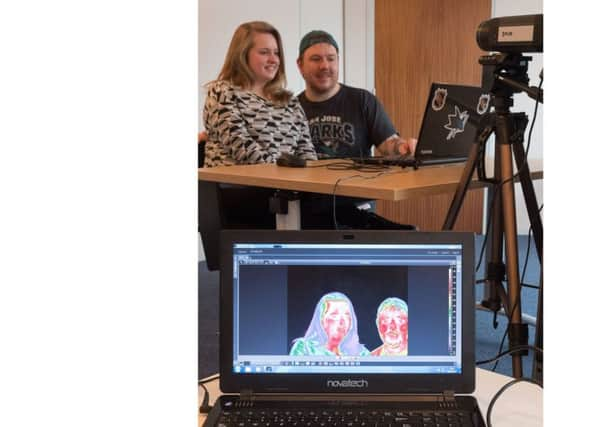University of Portsmouth's psychology open day shines a light on the mind's inner workings


The University of Portsmouth’s psychology department threw open its doors to the public over the weekend as part of British Science Week.
People had a chance to see the cutting-edge research being carried out by the institution’s crop of students and lecturers.
Advertisement
Hide AdAdvertisement
Hide AdGuests could experience a burglary simulator which is being used to work out how thieves would ‘case’ a victim’s home.
Psychology lecturer Dr Hannah Cassidy said the game was proving an invaluable tool for police.
She explained the device was allowing officers to see how burglars would typically act when raiding a home.
‘It’s really interesting to see how different people react to it all,’ she said.
Advertisement
Hide AdAdvertisement
Hide Ad‘Most people will go straight through the front door while those with criminal tendencies tended to enter the home through the back door.’
Also on display was the university’s research into deception, which is being used by police to help tell when people are lying during interviews. But it was not all just crime that was the focus because the open event also featured an array of talks by experts, on topics ranging from understanding babies’ cries, to debunking the myths around forensic psychology.
Visitors even had a chance to join a hi-tech experiment with a thermal imaging camera that is being used to record people’s moods.
The test saw couples enter a lab and attempt to diffuse a ‘bomb’ – one person could see the device while the other had to relay specific instructions from behind a screen.
Advertisement
Hide AdAdvertisement
Hide AdPhD student Marc Baker, 34, is leading the experiment, supported by undergraduate researcher Sapphire Payne, 21.
His aim is to see what effect different emotional reactions have on body temperature.
He said: ‘It’s fascinating. What we have noticed is that when people are angry, their faces light up bright white and increase in temperature.
‘But it’s the unexpected things that are the most surprising. For example, when people are frustrated, their nose cools down.’
Advertisement
Hide AdAdvertisement
Hide AdScott Davis, 23, took part in the test and was startled by the results. ‘I really didn’t feel any change,’ he said.
Dr James Ost, the university’s psychology head, said the day was a great success.
‘A lot of people think that university work is esoteric and kept in ivory towers,’ he added. ‘That’s not the case at all. We want to open the doors and show people what we do. We will do it bigger and better next year.’